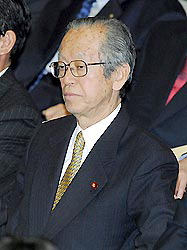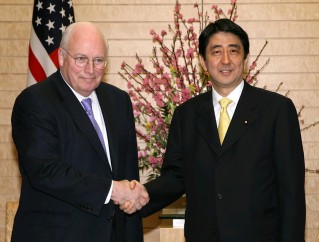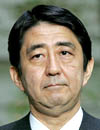Not even 3 weeks into the new Diet Session, and the Asahi has already dismissed the Diet debate as “disappointing.” I don’t know which debates they’re watching. Sure, the DPJ has elected to try and deflect attention away from the political fund scandal (since party president Ozawa has the same problem), but so far I’ve seen lots of interesting stuff:
Lower House Budget Comittee:
1. Kokumin Shinto president (and ousted LDP heavy) Shizuka Kamei made a flamboyant splash onto the scene with his first appearance asking questions in this committee in 6 years, this time as an opposition member. Though he “never in his wildest dreams thought” he would be questioning Shinzo Abe from the opposition, he went on to praise the PM as someone with good policies — if only he’d express them (here he is talking about the more hawkish attitudes Abe was famous for before he gained the premiership – strong rhetoric about territorial disputes etc). He pleaded with Abe to back away from Koizumi style winner take all politics (such as economic reforms that supposedly work for America’s national interest) and work to really make Japan better. But the most explosive of his comments came when he started questioning Abe on the appropriateness of the relationship between the LDP and its coalition partner, the Soka Gakkai-backed Komeito. Though he said he has nothing against “new religions,” even saying that both he and Abe have enjoyed the benefits of spiritual guidance, he accused the LDP of providing too much electoral support to the Komeito and passing an education bill that suits Soka Gakkai’s interests. After the Komeito demanded Kamei retract his assertion that the Komeito “supports the Iraq war,” Kamei stood by it and offered to engage in a public debate with the Komeito at Tokyo Dome. “They could even mobilize all the Soka Gakkai members.” I’m praying the Komeito takes him up on the offer.
(excerpts from the exchange here, video excerpt here)
2. The Socialist Democratic Party’s Nobuto Hosaka is closely pursuing the facts on a scandal involving improprieties over government-sponsored events (including faked town meetings), the management for most of which was contracted out to advertising giant Dentsu. At the Feb 14 meeting of the committee Hosaka questioned Supreme Court officials about the facts involving the recent incident in which people were paid to attend public forums on the Supreme Court’s new lay judge system (more info on the triangle of shadiness here). It turns out that the Supreme Court had very likely assigned Dentsu and others involved to begin promotion of the events before a contract had been signed between the government and Dentsu, the contractor charged with managing the events. How does Hosaka know this? After reviewing materials that he requested from the Supreme Court, he found that the contracts and estimates with Dentsu for all the events was dated the day before the kickoff even in Fukuoka. If there had been no agreement between Dentsu and the government before then, that would have given Dentsu less than 24 hours to pick regional newspapers to subcontract the management/promotion of the events, and then book venues/panelists, attract participants. But of course that’s not what happened. Promotional posters for the events were on bulletin boards long before that, the venues were booked ahead of time, and the attendance was healthy throughout (thanks to “gratitude payments”). Even more suspicious, the amounts charged in the invoices submitted by Dentsu to the government are identical to the amounts listed in the contracts and estimates.
All this despite the fact that (on paper at least) Dentsu was selected to manage the events after winning a “project competition,” which is a way for the government to add a form of competition to the awarding of no-bid contracts while avoiding the cumbersome government procurement process. Hosaka alleges that the dates on these contracts/estimates are fraudulent and created as an afterthough (a “sakanobori keiyaku” or “backdated contract”). This practice was typical of the fraudulent town meetings as well, Hosaka notes, and is in violation of the Public Account Law.
3. Prime Minister Abe isn’t a big fan of the New York Times. During a back and forth with the premier, DPJ member Arai quoted a recent NYT piece authored by Norimitsu Onishi that gave some sympathetic coverage of the recently bankrupted town of Yubari in Hokkaido prefecture. Arai was trying to argue that the national government needs to take more responsibility over the city’s bankruptcy (it is currently insisting that the town drastically restructure to pay off its bond obligations). Abe called the piece “insufficiently researched” because it neglected to note that the Yubari government hid its dire financial situation improperly and even gave city officials bigger bonuses in the year before the situation came to light. No press coverage of this exchange yet that I have seen.
 4. Finance Minister Koji Omi got slammed by Sumio Mabuchi (DPJ) over a slightly scandalous situation: Omi’s daughter accompanied the minister at meetings that he attended as an observer to establish his pet project, the Okinawa Institute for Science and Technology. Omi explained that she was there to help interpret the meetings and that she received no payment for her attendance. However, the problem with this, according to Mabuchi, is that a) Part of her hotel expenses as well as fees for meals and receptions were paid for with public funds, and b) If he really needs a translator he should hire a professional.
4. Finance Minister Koji Omi got slammed by Sumio Mabuchi (DPJ) over a slightly scandalous situation: Omi’s daughter accompanied the minister at meetings that he attended as an observer to establish his pet project, the Okinawa Institute for Science and Technology. Omi explained that she was there to help interpret the meetings and that she received no payment for her attendance. However, the problem with this, according to Mabuchi, is that a) Part of her hotel expenses as well as fees for meals and receptions were paid for with public funds, and b) If he really needs a translator he should hire a professional.
Now, this might not sound like a big deal, but I found Omi’s reaction to be pretty interesting. First of all, his primary excuse for bringing his daughter was one of the classic linguistic copouts: he claimed that his “hearing” abilities weren’t up to snuff, and since the meetings were all conducted in English, he brought his capable daughter along to help. This is despite his reputation for having “perfect English” at least according to US Treasury Secretary Henry Paulson. Second, Omi felt that Mabuchi was being “rude” for insinuating that Omi was being shady when he’s been working “with great ambition” to make this project happen for the good of the country. Working for the good of the country is one thing, using your status and public funds to take your daughter on a business trip to meet influential people is quite another. (Stories on this topic: Asahi, Yomiuri, Mainichi, quotes from the exchange via TBS here).


 4. Finance Minister Koji Omi got slammed by Sumio Mabuchi (DPJ) over a slightly scandalous situation: Omi’s daughter accompanied the minister at meetings that he attended as an observer to establish his pet project, the
4. Finance Minister Koji Omi got slammed by Sumio Mabuchi (DPJ) over a slightly scandalous situation: Omi’s daughter accompanied the minister at meetings that he attended as an observer to establish his pet project, the  There are those who have argued for interest rate increases by claiming that a rate hike would provide a better return on savings accounts. This, of course, is disingenuous. Current returns are next to nil; even doubling the prime rate from 0.25% to 0.50% would mean little in the way of returns on savings accounts. It would, however, mean substantial increases in terms of mortgages, business loans and automobile loans.
There are those who have argued for interest rate increases by claiming that a rate hike would provide a better return on savings accounts. This, of course, is disingenuous. Current returns are next to nil; even doubling the prime rate from 0.25% to 0.50% would mean little in the way of returns on savings accounts. It would, however, mean substantial increases in terms of mortgages, business loans and automobile loans.